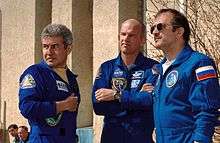Marcos Pontes
| Marcos Cesar Pontes | |
|---|---|
 | |
| AEB Astronaut / Astronauta | |
| Nationality | Brazilian |
| Status | Active |
| Born |
March 11, 1963 Bauru, São Paulo, Brazil |
Other occupation | Fighter pilot |
| Rank | Lieutenant-Colonel |
Time in space | 9d 21h 17m |
| Selection | 1998 NASA Group |
| Missions | Soyuz TMA-8, Soyuz TMA-7 |
Mission insignia |
|
Marcos Cesar Pontes (born March 11, 1963) is a Brazilian Air Force pilot and AEB astronaut. He became the first Brazilian and the first Lusophone to go into space when he launched into the International Space Station aboard Soyuz TMA-8 on March 30, 2006. He is the only Brazilian to have completed the NASA astronaut training program, although he switched to training in Russia after NASA's Space Shuttle program encountered problems. He is married and has two children.
Early life
Pontes was born in the town of Bauru, in the southeastern state of São Paulo.
Career
Pontes is one of the most experienced jet pilots in the Brazilian Air Force (FAB), where he holds the rank of Lieutenant-Colonel and has flown for more than 2000 hours in 25 different aircraft. In June 1998, he was selected by the Brazilian Space Agency to train in the NASA space program after he acquired a space-related background in the Aeronautical Engineering division of the Instituto Tecnológico de Aeronáutica (the Aeronautics Technological Institute, or "ITA"), which he transferred to in pursuit of a childhood dream to become an astronaut. He began NASA training in August 1998 and qualified as Space Shuttle Mission Specialist in December 2000.
Initially, Pontes' maiden spaceflight was scheduled to be on a Space Shuttle, where he was to help transport the ExPRESS Pallet, which would have been the International Space Station's first Brazilian-made component, into orbit. Negotiations between NASA and AEB (the Brazilian Space Agency) fell through due to the Express Pallet budgetary concerns from the Brazilian conunterpart. During the delay Pontes ran a campaign to hasten the Brazilian government to complete the Express Pallet, and worked on technical assignments in the Astronaut Office Space Station Operations Branch at NASA. His flight was postponed indefinitely when AEB confirmed that it could not produce the Express Pallet and its components for NASA.

On September 2, 2005, an agreement which cost about US$20 million between the governments of Brazil and Russia provided for Pontes to train at Star City, near Moscow, to learn about the Soyuz's operational and life-support systems, and to fly to the International Space Station in March 2006. The agreement was signed by the presidents of the Brazilian and Russian space agencies, Sérgio Gaudenzi and Anatoli Perminov, respectively.
Pontes' flight coincided with celebrations of the 100th anniversary of Brazilian aviation pioneer Alberto Santos-Dumont's successful flight of a fixed-wing airplane in Paris in October 1906.
On March 30, 2006, Pontes became the first Brazilian and the first native Portuguese-speaking person to go into space, where he stayed on the International Space Station for a week. During his trip, Pontes carried out eight experiments selected by the Brazilian Space Agency. He landed in Kazakhstan on April 8, 2006, with the crew of Expedition 12.
Following the Soyuz mission, Pontes returned to his technical duties for the International Space Station Program at the Johnson Space Center, working with FIESP/SENAI-SP for the development and fabrication of the Brazilian parts for the ISS. Pontes has since retired from the NASA's active Astronaut Corps. He is also an Invited Researcher at the Institute for Advanced Studies of the University of São Paulo at São Carlos.[1]
Education
He went to the Naval Postgraduate School and many others too.
Awards
Marcos received the Air Force Meritorious Service and Santos Dumont medals.
See also
- Timeline of space travel by nationality
- Brazilian Space Agency
- National Institute for Space Research (INPE)
- Aeronautics Technological Institute (ITA)
- University of São Paulo (USP)
- Brazilian General Command for Aerospace Technology (CTA)
References
External links
| Wikimedia Commons has media related to Marcos Pontes. |
- NASA website biography of Pontes
- Brazil, Russia Agree To Send Brazilian Cosmonaut To Space
- Brazil's President In Moscow Signs Deal For Joint Space Mission
- Spacefacts biography of Marcos Pontes
- Air Force Technological Institute (ITA)
- Brazilian Space Agency
- Marcos Pontes' official website (flash required) (Portuguese)